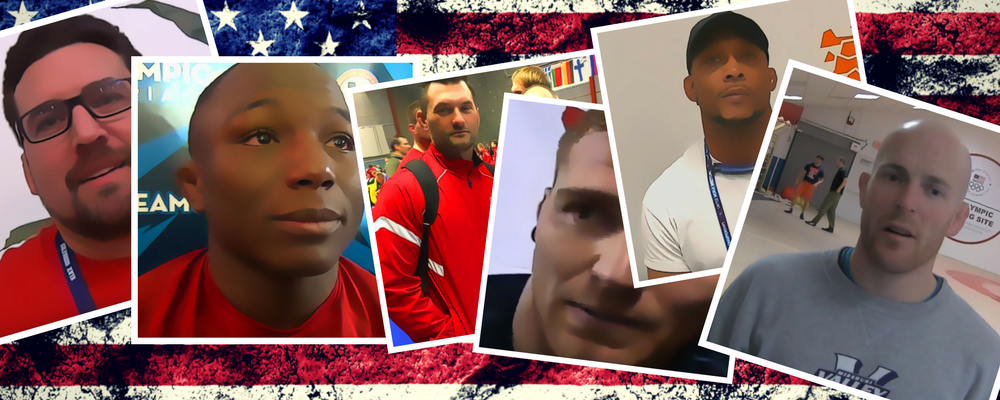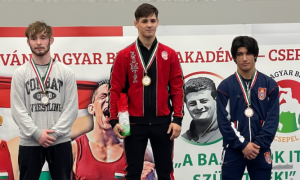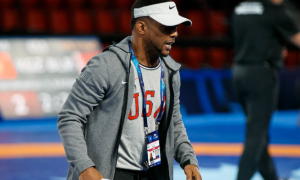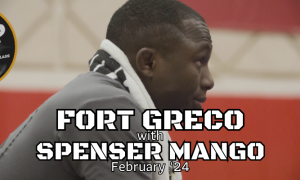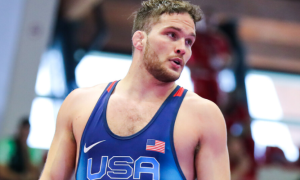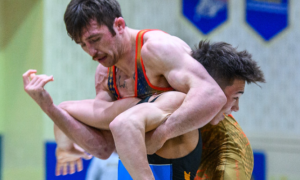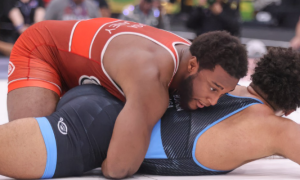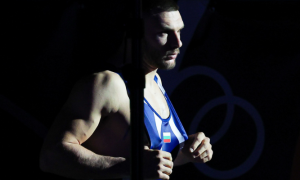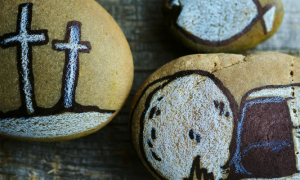The list of United States Greco-Roman coaches for all three major World Championships in 2018 is now (finally) public. The names associated with these positions have been known for more than a minute at this juncture, but the cat needed to stay firmly in the bag until word became official.
All of the coaches who will be manning corners at the Worlds for the US are well-known within the Greco community and possess the acumen/experience required for the task. However, there are expectations in place for each age group with different reasoning attached, and those are outlined below. Each coach for the three squads was kind enough to offer their insights on their selections as well as provide a glimpse of potential training plans coming up later on in the summer.
Senior World Team
For the Seniors, who will see their World Championships take place beginning on October 25th in Budapest in Hungary, it will be Zac Dominguez and Spenser Mango. Dominguez, once a top-flight national competitor, quickly established himself as one of the most respected domestic age-group coaches in the country and has been on several staffs for Team USA throughout the years. Most recently, he, along with Lucas Steldt, presided over the US Cadet World Team in Athens that saw nine out of ten wrestlers win multiple matches along with Cohlton Schultz (100 kg, NYAC) earning gold.
Mango retired in 2016 following a sparkling decade-plus career. A two-time Olympian and six-time World Team member, he is widely recognized as one of the very best of his generation. Immediately upon retirement, Mango stayed put, taking an assistant coaching position with Army/WCAP. In the summer of 2016, he helped run practices for the Rio Olympic squad while US National Team head coach Matt Lindland was overseas prior to taking on an even heavier workload this past season. Both Dominguez and Mango began their Senior Greco-Roman careers at Northern Michigan University’s US Olympic Education Center, the former as part of the program’s inaugural class.
The last US Senior to earn a medal at the World Championships was Andy Bisek in 2015 (bronze, Las Vegas). Since then, Team USA Seniors have won a combined seven matches between the Rio Olympics and the 2017 Worlds with no athlete having reached a medal match. It’s a troubling yet dichotomistic stat, particularly due to the high number of medals won by US Seniors at other international events the past two years. It’s also a trend that needs to change — and quickly — especially with the Olympic Year of 2020 now right around the corner. It isn’t just that the Americans can’t afford three down World events in a row — although that’s true. But right now, elevating the program heading into 2019 and getting those ducks in a row to hopefully bolster solid qualifying runs for Tokyo has to be on everyone’s mind, as well. The US does not want a repeat of 2016 in that regard. Each year may be different, but it doesn’t appear that way when the results remain the same.
Improving the performance of Team USA at the World level is of the utmost priority and though a lot of preparation for that will be accomplished separate from Dominguez and Mango, it will be up to them to help see the process through at the most pivotal moments possible. Mango has a leg up being a coach at WCAP in Colorado Springs and is extremely familiar with all of the major players to the point where it’s an understatement. Most of the Senior candidates also know Dominguez, it’s hard not to. But as Dominguez himself intimates below, gaining trust and building a deeper rapport with the athletes as the training phase cranks into gear is a critical part of his job description. Because he is so well-liked and dedicated to the opportunity, it’s difficult to picture that being any sort of hangup prior to Budapest.

Dominguez (first photo on the left) is making his third World Team coaching appearance in four years while Mango (pictured with WCAP’s Ildar Hafizov) is getting the call for the first time following his retirement. (Photos: Richard Immel/USA Wrestling)
Zac Dominguez
5PM: You’ve been a coach on several teams at different levels before. What does it feel like being selected to help lead the Senior squad at the next Worlds?
Dominguez: It’s an unbelievable feeling. I’m super-excited, I’m super-honored, and I am going to give 110%, if that’s possible. I’m just overwhelmed and I want to do better. I want to do better by our sport and this is how I can do it.
5PM: How do you draw from your previous experience coaching at international events in the past and apply it towards what is a whole new adventure this time around, particularly because of the age group?
Dominguez: The primary here for me is the decorum in a wrestling match at the international level is entirely different than the decorum in the USA. My goal this year as a coach is to keep that same decorum in the US and in the way I handle myself in the corner while trying to build upon how I get to a referee. Not get to them or yell at them, but reading that referee. And I’m not picking on referees, but it’s two different worlds of referees. That new coach goes overseas and is like, I can’t even say anything, right? For instance, at the Cadet Worlds with Ivan (Delchev), I got yelled at by the referee. I was like, I’m okay, nothing bad happened. Of course I’m not trying to get yelled at by the ref, he sat me down, I was just trying to relay info to Ivan and get him to know who was winning, the scores, especially during the Ridge Lovett match when it became kind of wild. And the referee sat me down and pushed me back, and that’s okay. I needed to get through that barrier of feeling okay regarding that decorum.
As far as coaching the Seniors, Cadets, and Juniors, obviously, the language I use with a Senior will be different than for the Cadets or Juniors, but the premise stays the same — hold positions, win positions, attack, attack, attack, defend when you’re supposed to, and just be in the moment. Be a wrestler. I don’t think that changes.
For a coach who is less of a Matt Lindland per se, who had a much larger competitive career and has now become well-versed in referees overseas because he’s been to so many tournaments, he (Lindland) is comfortable, and that’s how I feel now. I feel like I’m comfortable now. I can go over there and I have no problem doing battle with the best coaches, the best referees, understanding what’s happening, and being a part of that process. That’s where I’m at now in my coaching career.
5PM: Your co-coach is Spenser Mango, everyone knows who Spenser is, as you do going back many years through the sport. What is it that you’re looking forward to about coaching with Spenser?
Dominguez: I’ve never coached with him before, but that’s what I am excited about. I get to coach with a young man who has obviously been a superstar in our sport and has the right pizazz. He’s an explosive personality just watching him wrestle throughout his career. I mean, how many highlight reels are there of Spenser Mango? I’m really excited to be a part of that highlight reel in his coaching career because I think the fireworks have just started for our coaches and it’s just going to keep being ignited the right way. He’s just a fantastic co-coach to be with.
5PM: One of the most important parts of this isn’t going to be just showing up in Budapest, it’s also going to involve training camps, other plans, so on. What do you have so far regarding any of this, is there anything scheduled? Is there a preview of any ideas you want to lay out yourself?
Dominguez: There hasn’t been a specific plan yet, it’s a big umbrella plan right now. Actually, what I am really excited about is as far as the Trials, the Open, and Budapest, I know I’ll be at every one of those events just because they paired them up the correct way. I’m really excited that the Greco-Roman World Team Trials are the same time as the Junior Duals in Tulsa. It actually works out great for me, it’s the same thing with the Open and the UWW Juniors (Trials), a lot of kids will be out there wrestling. But of course, I’ll be able to sit down at the table with Matt and Gary (Mayabb) during the Open and we’ll definitely be able to pencil in how we’re looking at training.
I’ve spoken to Gary a couple of times, we’re talking about seeing if we can get some guys out to my place, work with them one-on-one and send them back to the training center (OTC). Or vice-versa, I’ll get out to the training center and it might be for four or five-day events during a month leading up to the World Team Trials where I get out there for a Tuesday and head home on Saturday, just so I’m there. Obviously, Spenser has an advantage and I have to keep up with him. He’s already there, so I have to get myself known, I know that’s important. I have to lay out the plan with Gary, we have a scheduled call next week I believe. I know we’re already into the Winter Training Camp, which is always a tough one because it never gets announced until after Winter Training Camp starts.
But I know we’ll have a couple of long camps and a couple that are more intimate tidbits with the wrestlers that we’re penciling in and saying, I think this guy should be the guy, so let’s get to work with him and plug our coaches in with these guys. I think Gary and Matt have laid out a good umbrella and what we’re going to do now is fill in the spaces with myself and Spenser quite a bit.
Spenser Mango
5PM: You’re only really a year and a half removed from competition and you’ve already been selected for a Senior World Team coaching spot. It’s come along pretty quickly, right?
Mango: Yeah, I do think it has come along pretty quickly, but I think our sport definitely needs it. I feel like we used to have a lot more interaction with the older athletes in the sport and they would stick around for a long time. I feel like now, guys aren’t wrestling to such an old age, so there is kind of a void in the room with the older athletes, or in my case, recently-retired athletes sticking around, giving pointers and trying to help the younger up-and-coming guys out. Maybe helping them out will shorten the amount of time it takes to learn different techniques or match game-plans than it took for say, myself. But I love that I’ve been selected to the coaching staff and I’m ready to help out as much as I can.
5PM: We of course don’t know who all ten World Teamers are going to be yet, but history and percentages say that a good brunt of them will come from somewhere in Colorado Springs. How does that help you in terms of relationships? I’d think it’s a good advantage because you’ll be familiar with practically everyone involved.
Mango: Right, I think knowing the athletes is key. It’s hard to coach someone you only see once or twice a year. I feel like I have a pretty good relationship with most, if not all of the athletes in the Colorado Springs area. I know their styles, too, and that plays a huge role when you’re trying to coach someone. If you know them and you have been watching them practice and seeing them for years, I feel like you can help them a lot more.
5PM: Your co-coach is Zac Dominguez. What do you know about Zac through your travels?
Mango: Actually, when Zac was competing I was just a youngin on the circuit, so I’ve known Zac for quite some time. I’m excited to take on this task with him.
5PM: With the results from Paris and U23’s, I’m not sure there is pressure, but I’d guess there is a sense of urgency surrounding the Senior program. Is that something that’s on your mind preparing for Budapest, the fact that it has been a couple of years since there has been some semblance of success and the program will be heading into a qualifying year after this Worlds is through?
Mango: You always want to build momentum. For years it was always, You guys haven’t gotten a medal in so many years. Nobody wants to hear that when they are preparing for a World Championships, or any tournament. So it would be nice this year to get some medals, build some momentum, and get the ball rolling to the year when we actually start qualifying the weight classes. Every tournament is important now and we have to get some guys ranked so we can go into the Worlds with a full head of steam.
Junior World Team
The Junior World Championships for Greco-Roman kick off on September 20th in Trnava, Slovakia and the US is going with two highly-motivated coaches to lead the charge — Herb House and Nate Engel. As an athlete, House was a Junior World bronze medalist (1992), a four-time University National Champion, and a Pan Ams bronze medalist (1993). His career was cut short during his prime due to a hand injury, but he stayed in the game coaching at the high school level until his talent became in higher demand for the Senior athletes. Eventually, he found himself on staff for the 2015 Senior World Team and again this past season for the Paris squad. And it goes without say, but given House was himself a successful Junior, there is little doubt he will be able to effectively communicate exactly what it takes for American athletes to compete with a purpose at this event.
Engel was an All-American at Missouri Valley College when he decided to enter into a full-time Greco career at Northern Michigan under the famed Ivan Ivanov. He flourished under Ivanov’s system in a room that included Mango, Bisek, Harry Lester, Jake Fisher, and Joe Betterman, among others. Engel wound up turning himself into a perennial contender, earning two appearances on the US National Team as well as several international placings, highlighted by a win at the 2012 Haparanda Cup and two bronze medals from the Maccabiah Games in Israel. When he decided to step away from competition, Engel walked right into coaching, first briefly as an assistant with Air Force before moving out east to the US Naval Academy, where he still is today. On the Greco side, Engel was also a coach for the 2015 Cadet World Team in Sarajevo with NMU’s Rob Hermann.
Two medals in 2016 and two more in ’17 including a gold means only one thing: the Juniors will be entering Slovakia shouldering maybe the highest expectations of all three age groups. Naturally, the projected members of the team play a role in that. Returning champ Kamal Bey (Sunkist) and ’16 bronze Taylor LaMont (60 kg, Sunkist) could be back for one more go ’round, provided they both don’t slip on banana peels before then. Schultz, fresh off of his Cadet title, is another year older (and stronger), which should increase his viability at the next step up. World silver Cevion Severado (50 kg, MO) didn’t win the Junior Trials but wowed audiences with his inspiring run to the finals. He could be in the argument again, too.
But there will be new blood in spaces up and down the lineup. Not every Junior World Team member is going to have the same experience as the names mentioned. House and Engel have an advantage in that most of the squad won’t require the same focus on refinement as some of the others. Instead, the coaches may find their biggest challenge is educating first-timers about what this level of competition represents. Provided they can achieve that in conjunction with the actual on-the-mat preparation, there’s no reason at this time why 2018’s team can’t be one for the record books.

PICTURED FROM LEFT: House instructing Mason Manville at the 2017 Senior World Championships in Paris, France. (Photo: Tony Rotundo); Engel urging on a Navy wrestler during a dual meet this past fall. (Photo: Navy Wrestling)
Herb House
5PM: This isn’t your first rodeo by any stretch but you’re with the Juniors coming up. What are some of the variables you have to take into consideration when preparing Juniors for a World event?
House: I think the biggest thing with Junior athletes is that you have to prepare them more and let them understand strategy, teaching them, and motivating them. You have to make these athletes, the Juniors, think that they are untouchable, that they are the best in the world. This year’s team is a great team. We have four medalists coming back. Taylor LaMont if he makes the team, Cevion (Severado) from Ohio if he makes the team, Kamal Bey, and you have Cohlton Schultz on the team this year, too, if he makes it. It will be a good lineup.
I think the big thing with this lineup is that guys like Kamal, Cohlton, and LaMont work with the Seniors a lot and I think they already know the expectations from us. But our goal for the Juniors I think is to get them as much international competition as we can, to have a plan and a strategy. Myself, Gary, and Nate, we’re going to sit down and figure out a strategy. We’re going to come in and train these guys so we can have the best performance we’ve ever had. That’s the main goal, making sure we have a plan going into the Junior Worlds this year.
5PM: You mentioned the word “expectations”, which is going to be a big one following the Junior team this year due to the reasons you just referred to. How do you temper expectations for the athletes who are clearly looked at as capable of achieving big things? How do you keep them in check?
House: The biggest thing I tell these athletes is, You are a target and they’re coming for you. Don’t think that just because you beat him the first time that he isn’t sitting at home doing ten more push-ups or 20 more pull-ups than you. He wants you. It’s not going to be the same as it was before. Every guy knows who you are and they are gunning for you. They are the underdog and have nothing to lose.
I tell every single one of those guys who has ever performed and is coming back — Kamal, Cohlton, LaMont, and whomever else, Cevion — they need to know that these guys will be coming for them. Don’t think that just because you had a great performance last year that the same results will happen. The only way it is going to happen is if you put 150% into it. To know that when you go out there, I’m going to wrestle everybody one by one and beat everybody one by one. I’m not going to get overconfident, I’m not going to think ahead, I’m just going to wrestle well. And that’s it, and we all will place. We’ll have a great performance. If everyone comes in and they do what they need to do, we will have a great performance.
5PM: How does the schedule factor in for some of the athletes who are preparing for both the Junior and Senior Trials? Do you have to manage training plans on an individual basis?
House: I think Gary, Matt, Nate, and myself are talking and it is really going to depend on who makes the (Senior) World Team from our Juniors. If Kamal makes it, LaMont makes it, or they come in number two or whatsoever, I think their schedules will have to be adjusted. Those guys will have to train and be switched to a Senior schedule similar to what we did with Tracy (G’Angelo Hancock) last year, where he trained with the Seniors a lot and then he flew over to the Junior Worlds afterwards. I think that’s a big possibility for what we can do, to pretty much get a lot of those guys to switch over to the Senior schedule. And after they’re done, they’ll go over to the Juniors and fly back to the Seniors if they make that World Team.
Nate Engel
5PM: You coached at the Cadet Worlds, so this isn’t really too new. Now you’ll be coaching a Junior Team that is expected to have the potential to bring a harvest of medals. Do you think about this now, the scope of talent you may have available heading into the summer?
Engel: Yeah, I mean, it’s exciting for the United States, not just Greco. I think last year they had a great year and going into 2018 they can do even more damage, so it’s exciting. It has been a long time coming for the Junior Greco athletes and I’ve been looking at all the talent. Some years, guys can win World titles and some guys can’t, it’s just the way some World Championships go, so hopefully we can go over there and win some more World titles.
5PM: Since your retirement you haven’t just been “a coach.” You started with Air Force, now you’re with Navy, you had the Cadet World Team a few years ago, and you’ve also coached age groups at Fargo and other places. How does your experience working with a wide assortment of athletes across two different styles help you with your responsibilities this time around?
Engel: I think that every kid is so different, whether they’re at the Naval Academy, Fargo, Cadets, it’s just so different, just like every kid who makes the Junior World Team is so different from the guys in the past or in the future. I think all of those experiences will come together and you just know that you’ll have to treat every World Team member differently as far as how they have to train to get on the podium. Some guys are workhorses you can push and push and push, like an Andy Bisek. Or you have some guys, like Harry Lester, who you could push, push, push, but towards the back-end of his career he had to train smarter and change it up a little bit.
I’m just looking forward to getting to know the team together with Herb House, Matt Lindland, and Gary Mayabb and putting together a plan so we can help these kids peak at the right time and bring home a lot of medals. But like I said, every World Team member is going to be different, and we have to listen to them and not just treat them all the same because it’s going to be different. We have to get them ready to go individually and compete as Team USA.
5PM: What does this mean to you personally in so far as your own coaching career, just because you are so busy and in-demand throughout the year with constantly working with the Navy wrestlers, traveling, recruiting, and so forth? Is this upcoming experience going to create more chaos than you’re already accustomed to?
Engel: Yeah, definitely, but not necessarily chaos, it’s just going to change things up a little bit more. Obviously, I am going to be gone more this year, but it’s exciting. My wife is the backbone of our marriage and she understands my love and passion for the sport. Folkstyle, freestyle, Greco, it doesn’t matter, just wrestling in general, and she is by far the most supportive person. Coach (Joel) Sharratt is very supportive as well because he knows how much I care about Greco being successful. For myself, it is also exciting. I just love the sport Greco and I love helping anybody out from little kids all the way to Senior-level athletes.
Anything I can do to help grow our sport and be successful internationally, I will definitely do as much as I can. I don’t know if it helps my own coaching career, I just think it’s exciting. I couldn’t care less about my own things, I just want to see guys get on the podium.
When they win it is contagious, not only is it contagious, but they’re smiling and you know that they are achieving goals and getting to that next level. Seeing guys win and get better at the sport of Greco is exciting because the light bulb clicks on and they think, This wasn’t as hard as I thought it would be. You just have to spend more time, like you do shooting a single or double-leg. Watching these athletes grow, and hopefully, whether they wrestle at the Senior-level, or Division I, Division II, Division III, NAIA — it doesn’t matter — they can still compete in Greco, reach that next level and win World medals. That is the most exciting thing for me. I’d love to come back to the United States with a team trophy and lot of medals.
Cadet World Team
The Cadets are being tasked with cracking open the trio of major World tournaments as their Championships are set to begin the first week of July in Zagreb, Croatia. The two men tabbed to lead the way make up one of the more intriguing coaching tandems in recent memory — Combat’s Lucas Steldt (who is back with the Cadets for the second year in a row) and former Senior star Mark Rial. Both are heavy on youth development, but it is the combination of Steldt’s hardcore emphasis on Greco and Rial’s equally-dedicated-yet-more-casual demeanor why this pairing has a chance to impart a really exciting blend of wrestling chemistry.
Rial spent the majority of his Senior career as one of the best in the country. In 1994, he came within arm’s reach of a bronze at the Cadet World Championships held in Frankfort, Illinois, placing fourth. On the folkstyle side he was of course no slouch, winning two Iowa state high school titles and later became an NCAA Division I qualifier for the University of Northern Iowa, his alma mater. But after college, Rial honed back in on Greco and moved to the Olympic Training Center in Colorado Springs, eventually garnering numerous international medals in addition to a win at the 2008 US Open. When his career concluded, the three-time National Team member transitioned into coaching, first at UNI and then later, Iowa Central, where he still lends a hand on the youth level. Rial has also been a state coach back home, helping oversee age-group competition at Fargo and the National Duals.
There probably isn’t a more devout Greco advocate in the United States than Steldt. As the founder of one of a very select few training academies that features the style 12 months a year, Steldt is looked at as somewhat of a guru. He has been on a multitude of overseas tours, most prominently in conjunction with Northern Michigan, though his latest endeavor, the Go Greco USA Developmental Program, has ratcheted up his involvement even more. Along with Dominguez, Steldt was a coach on 2017’s Cadet World staff and his selection made sense. While he holds significant experience working with Seniors, his desire to introduce Greco-Roman on a mass scale to the age groups is nearly unparalleled.
A lot has been said of Schultz’s historic run in Athens, and rightfully so. Each match offered high drama and that he made good on the hype (and the way he did) is something that will live on for quite a while. But what gets lost in the haze of that gold is how Schultz’s teammates performed. As noted in the Senior intro, nine out of ten US Cadets won more than one match at the World Championships. There might have only been one individual medal, but it doesn’t seem like that months later due to the confidence and ferocity those kids competed with. The only matches lost by Americans, by and large, was due to inexperience. With several members of the ’17 squad eligible to return, it is fair to say that optimism for multiple pieces of hardware will be sky high leading into Croatia.

Rial, shown here on the left attempting to reverse lift Jake Deitchler in the finals of the 2008 US Open, was one of America’s finest Senior competitors throughout his career. (Photo: John Sachs); Steldt has earned a reputation as one of Greco-Roman’s staunchest domestic advocates and continues to be an influential figure for promoting the style at the developmental levels. (Photo: Maja Casey)
Mark Rial
5PM: What piqued your interest in throwing your hat into the ring for one of these coaching positions?
Rial: I guess the main thing was to get Greco back to where it is established and recognized the same way as freestyle. Obviously, I started competing after college and didn’t complete my end goal, and that is kind of a driving force on the coaching side as well, passing my knowledge onto the younger guys and the guys who are going through what I did. Coming up in the state of Iowa, I wrestled a lot of folkstyle and I was fortunate enough to get involved early on in Greco and freestyle, and there is a solid push for that in the state. There was a good crew when I was coming up and helpful people around. I thought I was a good Greco guy when I was in high school, but I didn’t have a freaking clue until I started training full-time after college.
The kids these days, they have a lot more information and they are a lot better technically and with positions at an earlier age. I am trying to pass some of the knowledge I’ve picked up along the way traveling and competing, and hopefully, it catches on to a few kids and they take it.
5PM: The technical variances between folkstyle and Greco receive a lot of attention in this country. From a developmental aspect, does the US need to do a better job of understanding how both styles compliment each other?
Rial: Well, yeah, and I didn’t actually realize it until I moved back to Iowa from Colorado that I was that much of a better wrestler competing in Greco than I was before. I moved to Northern Iowa from Colorado to help coach and still competed, and I just felt there were a lot of things Greco presents related to positions that overlaps. If you have that skill-set it is more advantageous. It’s something a lot of coaches shy away from because they’re scared of it. Maybe they’re scared of it because they just don’t know. I think Greco adds a lot to any style and the more well-rounded you are, the better. I see it all the time in folkstyle where guys are wrestling from certain positions, don’t have a clue, and then they go into panic mode. It’s something that brings a lot to any style, honestly.
5PM: Signs point to this coming year’s Cadet team perhaps performing maybe even a whole step better than last year’s team did, and the ’17 squad was terrific despite only having one medalist. When you look at the kids who might be available for this team, do you see it as a chance to work with a fresh group that you can make an impact on?
Rial: Being selected as a coach, you hope to have an impact and make a difference. I don’t know how much time we’re going to have, but they have what they do. You’re not going to change anything. Working with great athletes who fight hard and wrestle the whole time and possess that skill-set is obviously going to be exciting. I’m looking forward to it and hoping to just add a little bit. And hopefully, I’m not getting in the way of anybody. I’m just eager to help, that’s it. I’m happy for the opportunity and extremely excited about it. I just want to help out Greco as a whole in the country and bring it to where it needs to be, where it should be, and that is winning medals at the World Championships. But then again, you can’t control a lot of stuff. You have to control what you know and it’s up to each individual, that’s the way I look at it.
5PM: You actually wrestled in this tournament and wrestled really well, in fact. Do you have any lessons from that experience you’d want to impress upon a first-time World Team member?
Rial: I was just thinking about that recently. Obviously, it was a long time ago (laughs). But I was like, Yeah, I did wrestle in that tournament. Of course, it was in the US and that changes it a little bit. But as far as the competition, I just remember not caring about who I was wrestling. I had a mindset to where I didn’t care if it was a Russian or someone else from another place that is supposed to be great at Greco, I’m going to go out there and beat them up.
The only thing I can take away from that is to enjoy that opportunity and make the most of it. That’s kind of cliché, but sometimes you kind of go through life and look ahead at stuff. Then you keep looking ahead and wind up forgetting about certain things, important things. You might not get a chance like this again. Instead of worrying about certain things, you have to just worry about scoring points and continuously improving on positions and stuff like that as far as the wrestling is concerned.
Lucas Steldt
5PM: You were a Cadet World Team coach last year, how did it wind up being two years in a row?
Steldt: I guess my ultimate goal was to move up, like Zac did to the Seniors, maybe go to the Juniors, the U23’s, and where Zac is right now. I would think every coach’s goal at some point is to be at the Olympic level or at least the Senior level. It was only my first year with the Cadets last year. I got my feet wet and Zac was really good at guiding me along that process. But two years in a row, it’s a good place to go back to in order to keep growing and keep building from. I think it would be premature to jump up a level right away after doing only one Worlds.
5PM: You had a World Champion last year and no other medalists, but it was still a pretty impressive overall performance. Is there a lot of optimism regarding what you may have to work with this year, especially when you look at who is going to be eligible?
Steldt: I guess. We had an awesome team last year, they were good kids, and really, just good people. It was really nice to hang out with those guys and be with them. But going into this year, it doesn’t matter what they did. That was a long time ago already, so it really depends on what they’re doing during folkstyle season and if they are keeping up with skills that they can hurry up and jump back into this spring. If the kids want to win a World title, if the kids want to win a World medal, then I’m really hoping we can build on what they started last year while they’re still Cadets. For me coming from Wisconsin when these kids are spread out all over the United States, I really hope they are training and that they are training now to be a World medalist instead of waiting. The Worlds now begin July 3rd, so they shouldn’t be dormant until May. I’m hoping they are doing stuff now to prepare for that.
I really think that with the World titles — Kamal Bey with the Juniors and Cohlton Schultz with the Cadets — that it showed people it could be done and hopefully, there are kids who I’ve never heard of or weren’t All-Americans at the World Team Trials last year who are now out doing things that will allow them to win a World medal this year. They might be kids who we weren’t looking at or kids we were, and maybe they do a better job this year because now they saw what Cohlton Schultz did, what Kamal Bey did. And maybe they also see what other guys are doing even if those guys didn’t get a medal. The process is almost like a trickle-down effect and it is happening. But what I think really matters is what the kids are doing now afterwards. I’m excited, but I am more waiting for what happens this spring when it comes to World Team Trials and what the wrestling looks like then.
5PM: How are you going to approach making potential adjustments once the team is selected?
Steldt: Well, with the Worlds being from July 3rd to the 8th, I actually think it benefits the United States and probably doesn’t benefit the foreigners. With us, the kids come out of the World Team Trials in early-June and four weeks later they are right into the World Championships. For us, the training cycle might be better, because hopefully, they are training very, very hard to make that World Team. And once they make that World Team, they don’t have any time to go to folkstyle camps or train freestyle too much. Hopefully, they are going to be focused on Greco to make that World Team and the excitement is really high for them so they can train Greco for four weeks and go to the World Championships. I think that would be better for us.
What I would like to see with those four weeks is that these kids are 100% dedicated to Greco-Roman wrestling. Because for four weeks, if we’re training everyday, they can get better, better than they even were for the World Team Trials. Last year, we took Cohlton Schultz to Croatia and Serbia to compete and train, and he wrestled the Hungarian (Balint Vatzi) at the first tournament in Zagreb and beat him. That was who he beat in the finals of the World Championships. At the next tournament in Serbia, that guy (Vatzi) took third I think and Cohlton took a silver to the Russian in the last second of the match, and he was dominating the Russian. We get to the World Championships and he had to wrestle a different Russian (Kantemir Shibzukhov) in the semis, won, and then wrestled the Hungarian in the finals and won after coming from behind.
So I would like to see, in a perfect world, is this: we select the team; go back home and chill a little bit; and then they would go to Croatia and Serbia to train and compete; and then head back out to the Worlds. Financially, I don’t know if that’s a possibility because these are very expensive things to do. But overall, I think we have a better shot for medals in my mind because of the guys we have will be 100% Greco for four weeks. And then if we lose them to freestyle and Fargo for a few weeks, they can do that. But I think for us, the way it sets up for us is a better timeline and we have four, five solid weeks from the Trials to the World Championships where it is 100% Greco everyday.
Listen to “5PM11: Greco-Roman World Teamer & former UFC Champion Randy Couture” on Spreaker.
SUBSCRIBE TO THE FIVE POINT MOVE PODCAST
iTunes | Stitcher | Spreaker | Google Play Music | RSS

Notice: Trying to get property 'term_id' of non-object in /home/fivepointwp/webapps/fivepointwp/wp-content/themes/flex-mag/functions.php on line 999

